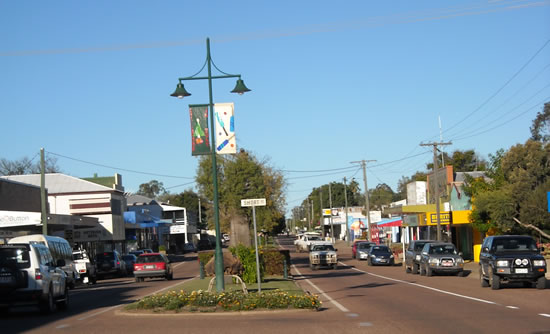
Explorer Thomas Mitchell reached this area in 1846 and the town is named after Sir Samuel Blackall, Queensland's second Governor.
Blackall was first settled in 1864 and in 1868 it was surveyed, gazetted and named after Samuel Wensley Blackall, then-governor of Queensland. The town is in the heart of the state's merino sheep breeding area and has the last intact example of a steam-powered wool washing plant, with a working shearing shed attached.
Blackall is a town rich in history and is the perfect base to explore Central Western Queensland. Whether you are caravanning, camping, staying in motels or hotels, Blackall can cater to your needs.
There is much to see and do in this friendly outback town.
Blackall Cultural Centre
Built in 1996 by the Blackall Shire Council. The form of the building is a large soft curved roof echoing the long rolling forms of the western topography. The building walls
form a backdrop to the line of mahogany and fig trees, which echo the cliffs of the hills, which interrupt the western plains.
The fabrics chosen represent the historical materials of western Queensland with colours that reflect the outback sunsets. The building has been designed to compliment the formal planning of the adjacent park. The gardens are ideal for outdoor functions. This is the perfect atmoshpere for events such as weddings, conferences and conventions, meetings and seminars, art exhibitions and performing arts.
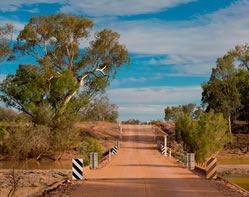 Barcoo River
Barcoo River
The Barcoo River is a many channelled watercourse which is mostly dry except for chains of waterholes during much of the year. With a sandy bed and bordered by coolibahs and ti-trees, the Barcoo River is
famed for yellow-belly fishing.
 Major Mitchell Clock
Major Mitchell Clock
The Major Mitchell Memorial Clock is located in the middle of Shamrock Street opposite the fossilised stump. The clock is in honour of Major Thomas Mitchell who
explored the area in 1846. The Mitchell grass that is common in the area is also named after this great explorer.
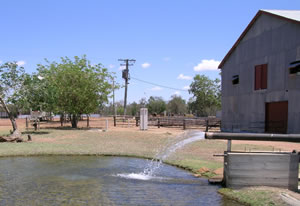
Blackall Woolscour
The last remaining steam driven Woolscour in Australia is now operating on steam again. Steam operates daily from May to August. Woolscour means wool washing,
and Blackall has the last example, left intact, of a steam powered wool washing plant with a 20 stand shearing shed attached. The Woolscour was once situated next to
an artesian free flowing bore, which supplied ample hot water for scouring. Today a replica of the bore can be seen.
Tours of the Woolscour operate every day, on the hour, from 9am to 5pm. Last tour leaving at 4pm. Each tour is conducted by a local character giving insights into the life of the Woolscour and Blackall. The original steam engine, dated 1908, is powered by steam to drive the wool washing plant.
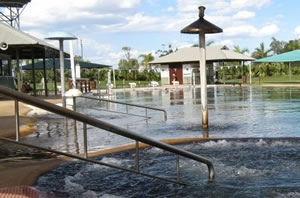
Aquatic Centre
The town is supplied with water from the Great Artesian Basin. The water is pure, uncontaminated and ideal for drinking. This water flows from the basin under its own
pressure and bores are usually drilled to a depth of 2500ft (800m). The water temperature in Blackall is 58 degrees Celsius, therefore a means of cooling water is more
important than heating.
Blackall was one of the first towns to drill for water and the Pioneer Bore can be seen at the end of Short Street. The Aquatic Centre has an artesian spa bath, and locally produced soft drinks are made from the artesian water. The Aquatic Centre is open all year.
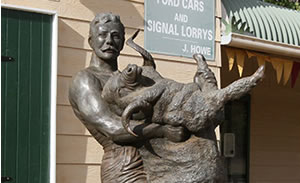
Jackie Howe
The legendary shearer, Jackie Howe, is a man well remembered in this town. He holds the record for shearing 321 sheep in 7 hours and 40 minutes, with blade shears,
at Alice Downs Station in 1892.
He retired from shearing in 1900 and became a publican of the Universal Hotel. The replica of the hotel is located in Shamrock Street, which is now the 'Universal Garden Centre and Gallery'. In front of the shop is a memorial statue of Jackie Howe.
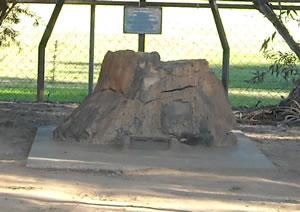
Black Stump
The Black Stump, located behind the State School in Thistle Street, was used for surveying purposes and permanently marks the original Astro Station established in
1887.
Surveyors placed their theodolites on the stump for latitude and longitude observations. The stump was used rather than a set of legs because it gave more stability to the theodolites.
This enabled the mapping of Queensland on a more accurate basis. It was considered at the time that country to the west of Blackall was 'beyond the Black Stump'.
"It is our desire to provide our guests with friendly country hospitality at all times."


